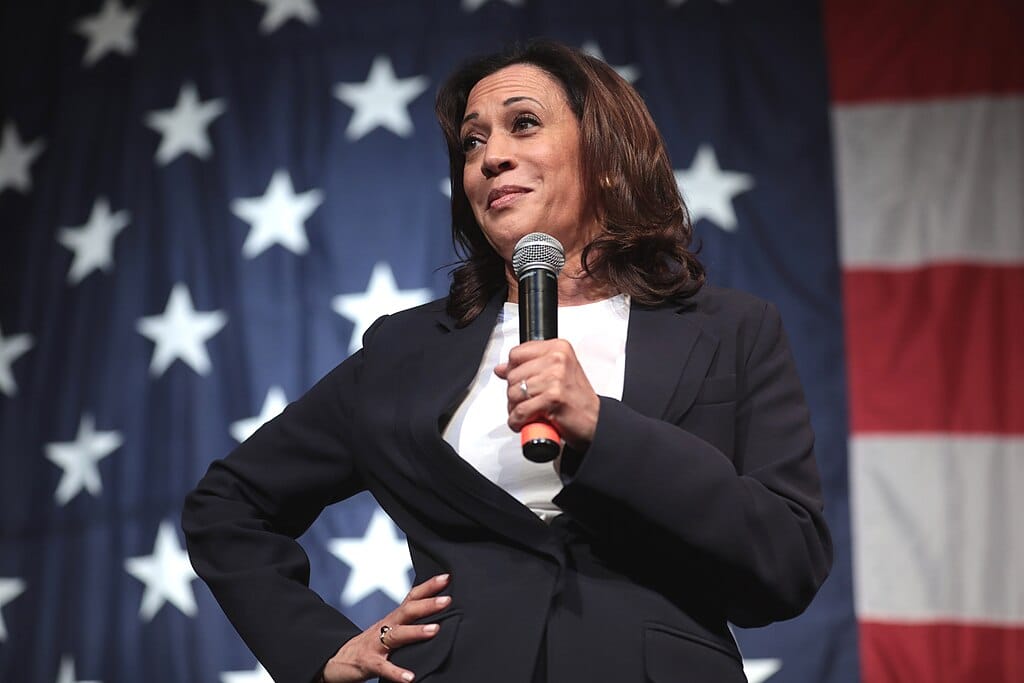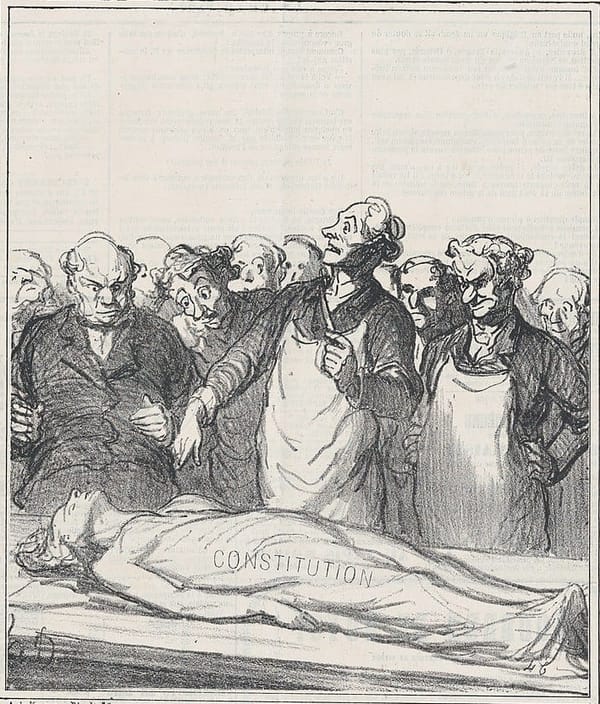To My Fellow Libertarians: It's Time to Embrace the Harris-Walz Ticket
Libertarians, long used to holding their noses to pick the lesser evil or abstaining entirely, now have plenty of reasons for enthusiasm.

Gun to your head, if you had to vote for Kamala Harris or Donald Trump, whom would you choose? This should be an easy question for libertarians, but for many it isn’t. “The gun would go off,” quipped Libertarian Party presidential candidate Chase Oliver in a recent interview with Reason magazine’s Nick Gillespie.
Oliver at least has the excuse of running a futile campaign for president, but plenty of other libertarians are expressing antipathy for the Harris-Walz ticket, or worse, actually supporting Donald Trump. If they’re leaning Democratic, they’re doing so begrudgingly, in the manner of a toddler eating their vegetables or an adult scheduling a colonoscopy.
As a longtime affiliate of the libertarian movement, I’ve often shared such pox-on-both-their-houses disdain for the major parties. In the current circumstances, I find it hopelessly dated and out of touch. The threats to liberty, democracy, and the rule of law coming from the Democrats and Republicans are not remotely symmetrical. In no presidential election in my lifetime has the question of whom to vote for been so easily decided.
My libertarian friends, I’m telling you: It’s OK to get excited about a major party ticket. You should endorse Harris and Walz, not with reluctance but with genuine enthusiasm.
As in 2020, the chief reason to root for the Democrats is that the Republican alternative is so obviously horrible. One shouldn’t need reminding of all the ways Trump’s first term was hostile to libertarian goals, to which we can now add in a potential second term his promise to deport 15–20 million people currently residing in the United States. Voting against anyone who talks about immigrants “poisoning the blood of our country” and threatening to deploy armed military and police squads to round them up by the millions is a good rough heuristic for libertarians to follow.
The aftermath of the 2020 election also proved that those of us who warned that Trump would attempt to overthrow its results were completely correct. If he loses by narrow margins in 2024, it’s equally obvious that he will try to do it again. As Adam Gurri wrote here at Liberal Currents.
Many of you wouldn't deny this, and even take it for granted. I am asking you not to take it for granted, to take seriously what it means to say that one party's candidate will not try to cripple our system of free and fair elections, and one party's candidate is guaranteed to. How high do his odds of success have to be before you treat this as a genuine emergency?
Trump now lacks the advantage of incumbency, but his supporters within the Republican party have learned from their failed coup in 2020. A second attempt will be less ad hoc, which is not necessarily to say less violent. Combined with Trump’s deportation threats and the growing influence of nationalist conservatism, particularly embodied by Trump’s running mate JD Vance, this is the most starkly authoritarian ticket in recent American history.
All of the above are compelling reasons to vote for Democrats, but the case is thankfully not just a negative one. On important issues, and especially with the addition of Tim Walz, the Democratic nominees offer quite a bit for libertarians to like.
Despite her “cop” reputation, Harris has become admirably liberal on cannabis. Unlike Biden, she supports federal legalization and sponsored a legalization bill as a senator. Walz’s record is even better. As governor of Minnesota he signed that state’s legalization bill, legalized safe consumption sites and possession of drug paraphernalia and testing equipment, and authorized a task force to explore therapeutic use of psychedelics. Harris and Walz are the first major party ticket ever to support legalizing cannabis and the most amenable overall to reforming the harms of the drug war.
Walz also offers a solid record of criminal justice reform. A review from the Marshall Project notes that reforms he signed into law include shortening unnecessarily long probation periods, eliminating life-without-parole sentences for teenagers, automatically expunging low-level crimes from the records of people who do not re-offend, and ending prison gerrymandering. Following the death of George Floyd, Walz signed bipartisan legislation on police accountability that includes “bans on chokeholds and warrior-style trainings, a duty for officers to intervene in misconduct, and changes to provide more data and independent oversight on police matters.”
Walz, like many Democrats, takes a more top-down and technocratic approach to climate than many libertarians would prefer. But he’s one of the few governors to have tackled the problem of why blue states can’t build, having recently signed a permitting reform bill to cut government red tape and expedite the construction of renewable energy projects. On housing he also seems to have some YIMBY cred, noting the need to remove barriers that artificially reduce the supply of housing.
Post-Dobbs, advocates of reproductive freedom should clearly favor Harris. Even if her administration is unable to restore Roe, it can take significant steps to ensure access to abortion. Conversely, even short of a national ban, there is much that a Trump administration could do to restrict it.
Finally, although it predates his career in politics, it’s worth highlighting Walz’s willingness to serve as faculty adviser to the gay-straight alliance at the school where he worked in 1999, sixteen years before Obergefell and during the era of Don’t Ask, Don’t Tell military policy. “It really needed to be the football coach, who was the soldier and was straight and was married,” Walz said of the decision.
That decision was a small act of human decency, but it’s part of a larger arc demonstrating the triumph of liberal values. Advocating for gay rights, reproductive freedom, and legalizing cannabis is no longer radical. Yet it’s remarkable to see these issues taken up not by the counterculture, but by a sixty-year-old straight white midwestern man, a former soldier and football coach, now a contender for vice president. A libertarian of the 1960s could only imagine!
Of course, there are plenty of issues on which libertarians and mainstream Democrats will not see eye-to-eye, particularly in economics and foreign policy. On some of these, Harris and Walz may prove to be genuinely terrible. Libertarian journalists and policy advocates can and should call out bad ideas from the left. But we should also resist the temptation to view these differences as symmetrically on par with dangers posed by the MAGA right.
As libertarian humorist P. J. O’Rourke back-handedly praised Hillary Clinton in 2016, she may have been wrong but she was “wrong within normal parameters.” Never has this been true of Donald Trump. For a decade he has been a toxic main character on the national stage, one who has increased the salience of politics to everyday life, debased the political right, and raised the stakes of every presidential election to existential levels. The 2024 election is a chance to finally send him slinking off, if not to prison than at least to his gaudy Florida resort. Libertarians should feel joy at the prospect.
There’s no need to overthink this. A vote for Harris and Walz is a vote to send Trump and Vance and their coterie of weird would-be authoritarians packing, to restore some normalcy to politics, to protect the rights of women, immigrants, LGBTQ Americans, and anyone who uses illicit substances, and to stand up for democracy, the Constitution, and the rule of law. My fellow libertarians, did you just fall out of a coconut tree? You shouldn’t need a gun to your head to make the right decision here.
Featured image is Kamala Harris, by Gage Skidmore




